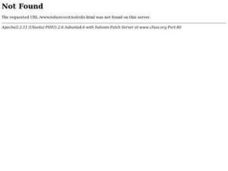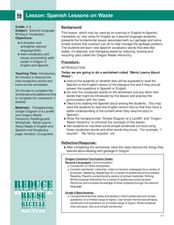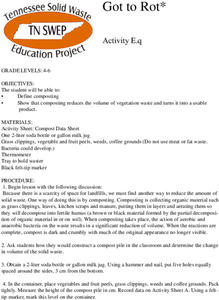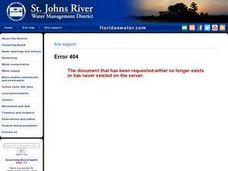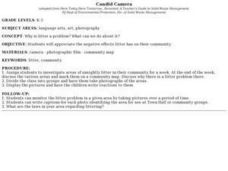Curated OER
Solid Waste Takes Over
Students explore solid waste and its effects on the environment. They explain some of the major problems caused by waste disposal and the use of landfills. They suggest ways to reduce the amount of solid waste going into a landfill.
Curated OER
Solid Waste and Recycling
Young scholars demonstrate effects of waste on environment and ways of reducing it, observe how much packaging goes into bag lunches each day, and survey their families to assess awareness levels and household recycling practices....
Curated OER
Spanish Lessons on Waste
Students investigate waste. In this environmental lesson, students read a worksheet in both Spanish and English and share how they recycle at home. Students are encouraged to use key vocabulary words from the worksheet such as "recycle"...
Curated OER
Recycling-Taking it Easy on the Environment
Students review the garbage/landfill graphs included with the lesson. They discuss the information on the graphs and discuss which garbage products come from their homes. Students collect examples of over packaging to share with class...
Curated OER
Recycling Paper
Students recycle old paper into new. In this sustainability lesson, students take old newspaper and recycle it into new paper.
Curated OER
Iona Wastewater Treatment Plant Field Trip
Students go on a field trip to the Iona Wastewater Treatment Plant and learn about sewage, waste, and pollution. For this treatment plant lesson plan, students also complete collection samples of quadrats.
Curated OER
The Rotten Truth
Fourth graders watch a video about how much solid waste is produced by each person and how it is disposed of. Using the internet, they identify and interpret data on the type of trash thrown out the most. They offer possible solutions...
Curated OER
Sludge
Students become familiar with the idea that sludge is a waste product but can also be a resource, depending on its characteristics and how we manage it. They read information and answers questions on a worksheet imbedded in this plan.
Curated OER
Got to Rot
Students make their own compost in a 2-liter jug and determine the actual volume loss in the composted material over a six-month period.
Curated OER
After the Garbage Can: Where Does Our Trash Go?
Young scholars explore how waste disposal has changed over time and what the current issues are. In this disposal activity students collect data and create graphs.
Curated OER
Recycling
Students study recycling. Group members conduct an experiment by making recycled paper over a four day period. If possible, your class will also take an excursion to a local recycling center.
Curated OER
Landfills, Leaks and Spills
Students define spills, leaks and landfills. Students list environmental problems caused by spills,leaks and landfills. Students access the Internet to complete Prediction lab report worksheets, etc. Students test/quiz over their...
Curated OER
Trash Count
Students identify pollution around their local community. They discuss the sources of polution and categorize objects based on their properties. They discover ways to make changes to the environment and how to inform the public.
Curated OER
Organic and Inorganic Recycling
Young scholars examine their role in polluting the environment and discuss the importance of recycling. In groups, they place earthworms into compost piles to observe why they are considered natural recyclers. They also practice...
Curated OER
Candid Camera
Students investigate the negative effects that litter has on the environment and their community. They photograph areas of litter in their community and write a reaction to the pictures.



